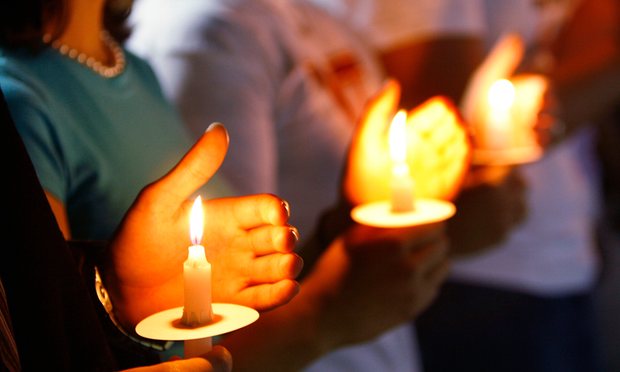Tips for Acknowledging a Public Tragedy
June 17, 2016
These days it seems we are surrounded by the destruction of senseless acts of violence. It sometimes feels as if the ground we walk on may suddenly collapse underneath our feet and we are scared. Scared for what tomorrow will bring. Scared for what evil lurks behind every shadow.
The shooting rampage last weekend in Orlando is sadly one more reason our nation is in mourning. Forty-nine people who walked into a building to celebrate – the weekend, their freedom or simply to enjoy being with friends – never made it out. Their lives were cut short in what is being called the worst mass shooting in the history of the United States.
In the hours, days and weeks after such tragedies, it’s difficult to sort through the myriad of emotions and especially challenging to determine how to properly respond. We’ve seen individuals and businesses over the years address shootings, attacks or natural disasters and suffer significant and swift backlash for appearing insensitive or as if they were trying to capitalize on others’ misfortune. Conversely, we have seen “helpers” emerge, bringing comfort and assistance to others during the darkest of times.
What is the best way to respond when a tragedy happens? Is there a right or wrong way? A simple Google search will reveal a plethora of individuals or companies who’ve landed on the wrong side of the fence when attempting to publicly share their thoughts on national tragedies. I will refrain from getting into those specifics and instead, provide some perspective and tips. In the end, it is you and only you who knows deep down what feels right, however don’t hesitate to seek counsel from your public relations or communications team. A second opinion is never a bad thing when you’re unsure of something.
Be present and acknowledge.
Whether it has happened in your backyard or thousands of miles away, if it is an event or situation dominating the news and social channels, it is something to which you should pay attention. Sometimes being oblivious is more harmful than saying or doing the “wrong thing.” You may not feel comfortable putting out something publicly, such as a social media post, but you can acknowledge what is happening by halting your business-as-usual activity. Turn off auto-posts on your social channels, delay sending out a monthly customer marketing email or pull commercials set to air in the days following. Not only is this a respectful way to approach a difficult situation, you are potentially avoiding the awkwardness of tweets or messages of self-promotion colliding with the news stories and somber tone.
Help.
There are many ways to help – from sharing messages of support, offering financial assistance or providing a free service, you can choose what method best fits you or your company. The key is to help for the greater good and not necessarily for the exposure. People are perceptive and will see through any effort that appears to be inauthentic or self-serving. Done well and with heart, any assistance will be appreciated and recognized in due time. Also, don’t forget your employees are likely suffering or struggling to process a tragedy. Offer to provide counseling resources, allow flexibility with schedules, encourage a moment of silence or share ways they can help victims – through donations, prayers or personal resources. Employees will appreciate you’ve acknowledged the event and have done the due diligence to provide options for the most useful ways they can participate in helping others – one of the best ways to manage through grief or fear.
Join the masses.
Instead of posting a tailored message, join in by sharing or engaging with other’s posts. You can do this by using a hashtag or modeling what you see other businesses doing that you feel is appropriate and useful. In times like these, sometimes it is best to join in, rather than seek attention with a clever image or poignant message.
Avoid negative.
It’s become too easy for critical and negative people to pick apart what others say and do especially in the wake of a terrible event. Often, these same folks seek attention by turning tragedy into an opportunity to spread their own political or religious messages or to create unnecessary drama and stress. This is probably their way of dealing with the trauma themselves, but it serves no useful purpose. The best advice is to move away from negative conversations and messages. I learned years ago as a parent that it’s acceptable to ignore bad behavior. Eventually, individuals tire out because they aren’t getting the attention they want. It worked with my son!
Be empathetic. Be real.
Terrible things happen every day in our communities, to those we work with and do business with, and across our nation and world. When we react with empathy and direct our focus to healing, we support the positive and push the negative and the fear down where it belongs.
Take your time.
Sometimes we feel a need to solve or fix a problem and we do so by inserting ourselves in ways that aren’t helpful. History has shown us that when a tragic event happens, the need for help extends well past the time media spotlights dim. There is no need to rush into something – take the time to assess and plan a meaningful effort.
Finally, others may suggest you promote what you’re doing – to get credit and to be hailed as a hero. While we pride ourselves on making our clients the heroes of their own stories, there is a time and a place for being proactive in telling that story. If it doesn’t feel appropriate, it likely isn’t. Do what feels right, do it with authenticity and do so without needing something in return. Be a comforter. Be a helper. The world needs more of both.
“When I was a boy and I would see scary things in the news, my mother would say to me, “Look for the helpers. You will always find people who are helping.” To this day, especially in times of “disaster,” I remember my mother’s words and I am always comforted by realizing that there are still so many helpers – so many caring people in this world.” –Fred Rogers
Our thoughts and prayers are with the Orlando shooting victims, their families and friends. #PrayforOrlando
Image Source: The Guardian
Business & Finance Articles on Business 2 Community
(7)



